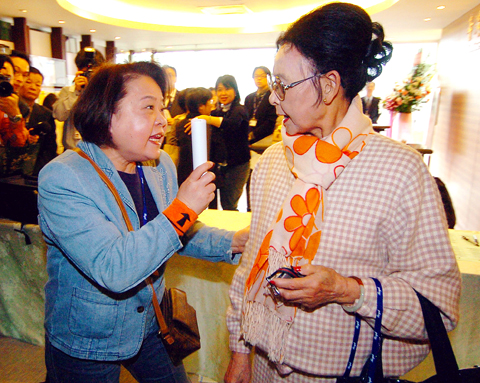Academia Sinica yesterday released newly acquired records from government intelligence agencies on victims of the 228 Incident and the White Terror, revealing the government’s close monitoring of academics and political activists, and details of secret sentences given to certain individuals.
The materials, purchased by Academia Sinica’s Institute of Taiwan History last year from private collectors, included informers or intelligence agent reports about the secret sentencing of Chang Chi-lang (張七郎), a former national assembly member who was killed by the military in the aftermath of the incident, and several other individuals who were killed after being falsely accused.
The materials also include lists of names of those suspected of being communists and details of the intelligence agency’s infiltration into political parties and educational institutions for monitoring purposes during the White Terror period.

PHOTO: LIAO CHEN-HUEI, TAIPEI TIMES
Hsu Hsueh-chi (?V), director of the institute, said the materials were purchased on the Internet last year and that they would facilitate more in-depth research on the incident from differing perspectives.
The new materials found cover 1,000 228 Incident victims. Following a cross-check, it was found that only 68 of them appear on the 228 Memorial Foundation’s victim list, showing that many victims and their families have never applied for compensation.
The 228 Incident refers to an uprising against the Chinese Nationalist Party (KMT) government that began on Feb. 27, 1947, and was followed by a bloody crackdown, resulting in the deaths of tens of thousands of civilians.
Hsu said the materials confirmed that Chang was killed by the military because of a personal conflict with a local government head rather than his involvement in the 228 Incident.
The materials also showed that Chiang Wei-chuan (蔣渭川), brother of Taiwanese democracy pioneer Chiang Wei-shui (蔣渭水), did not provoke political conflict during the White Terror era.
Chen Yi-shen (陳儀深), a board member of the 228 Memorial Foundation, however, said except for the information on Chang, most of the new material was not that “fresh,” as Academia Historica also held similar material.
Chen said the 228 Incident carried a lot of political meaning and academic research alone offered limited help when promoting social reconciliation.
Chen criticized the government for acknowledging the responsibility of late dictator Chiang Kai-shek (蔣介石) for the incident, while still planning to replace the name plaque of the National Taiwan Democracy Memorial Hall with that from the original Chiang Kai-shek Memorial Hall to honor him.

The High Prosecutors’ Office yesterday withdrew an appeal against the acquittal of a former bank manager 22 years after his death, marking Taiwan’s first instance of prosecutors rendering posthumous justice to a wrongfully convicted defendant. Chu Ching-en (諸慶恩) — formerly a manager at the Taipei branch of BNP Paribas — was in 1999 accused by Weng Mao-chung (翁茂鍾), then-president of Chia Her Industrial Co, of forging a request for a fixed deposit of US$10 million by I-Hwa Industrial Co, a subsidiary of Chia Her, which was used as collateral. Chu was ruled not guilty in the first trial, but was found guilty

DEADLOCK: As the commission is unable to forum a quorum to review license renewal applications, the channel operators are not at fault and can air past their license date The National Communications Commission (NCC) yesterday said that the Public Television Service (PTS) and 36 other television and radio broadcasters could continue airing, despite the commission’s inability to meet a quorum to review their license renewal applications. The licenses of PTS and the other channels are set to expire between this month and June. The National Communications Commission Organization Act (國家通訊傳播委員會組織法) stipulates that the commission must meet the mandated quorum of four to hold a valid meeting. The seven-member commission currently has only three commissioners. “We have informed the channel operators of the progress we have made in reviewing their license renewal applications, and

‘DENIAL DEFENSE’: The US would increase its military presence with uncrewed ships, and submarines, while boosting defense in the Indo-Pacific, a Pete Hegseth memo said The US is reorienting its military strategy to focus primarily on deterring a potential Chinese invasion of Taiwan, a memo signed by US Secretary of Defense Pete Hegseth showed. The memo also called on Taiwan to increase its defense spending. The document, known as the “Interim National Defense Strategic Guidance,” was distributed this month and detailed the national defense plans of US President Donald Trump’s administration, an article in the Washington Post said on Saturday. It outlines how the US can prepare for a potential war with China and defend itself from threats in the “near abroad,” including Greenland and the Panama

Taiwan People’s Party (TPP) Chairman Huang Kuo-chang (黃國昌) yesterday appealed to the authorities to release former Taipei mayor Ko Wen-je (柯文哲) from pretrial detention amid conflicting reports about his health. The TPP at a news conference on Thursday said that Ko should be released to a hospital for treatment, adding that he has blood in his urine and had spells of pain and nausea followed by vomiting over the past three months. Hsieh Yen-yau (謝炎堯), a retired professor of internal medicine and Ko’s former teacher, said that Ko’s symptoms aligned with gallstones, kidney inflammation and potentially dangerous heart conditions. Ko, charged with